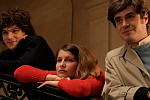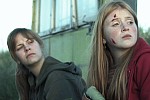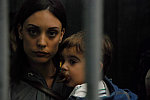 Shadows off the beaten path
Shadows off the beaten pathLION'S DEN | PATRIK, AGE 1.5
< < F O R E I G N > >
last update 5.Apr.09
See also: SHADOWS FILM FESTIVAL
 R E V I E W B Y R I C H C L I N E
R E V I E W B Y R I C H C L I N E Nés en 68: Nous Nous Aimerons Jusqu’à la Mort
Nés en 68: Nous Nous Aimerons Jusqu’à la Mort
with Laetitia Casta, Yannick Renier, Yann Trégouët, Christine Citti, Marc Citti, Sabrina Seyvecou, Théo Frilet, Edouard Collin, Kate Moran, Fejria Deliba, Gaëtan Gallier, Osman Elkharraz
 release Fr 21.May.08,
release Fr 21.May.08, UK 25.Sep.09
08/France 2h53

 After the frothy COCKLES & MUSCLES, Ducastel and Martineau turn to this ambitious multi-generational epic that, even at three hours, feels too brisk. We actually want more time with these fascinating people.
After the frothy COCKLES & MUSCLES, Ducastel and Martineau turn to this ambitious multi-generational epic that, even at three hours, feels too brisk. We actually want more time with these fascinating people.
During the student demonstrations of 1968 Paris, Catherine (Casta) is pregnant with the child of her boyfriend Yves (Renier) and living in free-love happiness with their friend Herve (Tregouet). They help set up a commune in a country farmhouse, getting to know local farmers Serge and Maryse (Citti and Citti). Years pass, Yves has moved to Paris to teach and a next generation of kids, including Catherine's son Boris (Frilet), is living out their dreams in a world their parents helped create. New issues challenge them, including marriage, children and Aids.
The film is packed with characters who are lively and energetic, and extremely well-played. They quickly come and go from each others' lives over 40 years, with potent scenes along the way that vividly highlight both the issues of the times and the connections between these people. Most vivid is the film's early section, with its collision of political issues and social challenges. Ducastel and Martineau present this with extraordinary affection, as a group of young people push the boundaries in an effort to live a full life in a corrupt, violent world.
As the plot begins to leap forwards in time, characters emerge and grow up before we really get to know them, coming together, falling apart, questioning themselves and learning big truths in brief bursts of screen time. The filmmakers originally made this as a pair of two-hour movies for French television, but even more time would deepen the experience, putting major world events that punctuate the story into more personal context.
This makes many things resonate strongly, such as the right-wing LePen during the notorious 2007 election: "You killed authority in 1968, and now France wants a father!" The film may be dialog-heavy, with everyone arguing about what is normal in society: marriage, sexuality, sexual freedom, work, relationships. But this is a vivid look at how people deal with birth, death, injustice and politics from generation to generation. And how the decisions of the parents affect the children.
3.Mar.09 llgff
 R E V I E W B Y R I C H C L I N E
R E V I E W B Y R I C H C L I N E Pusinky
Pusinky
with Marie Dolezalova, Petra Nesvacilova, Sandra Novakova, Oldrich Hajlich, Erik Kalivoda, Matej Ruppert, Lenka Vlasakova, Filip Blazek, Mario Kubas
 release Czech Republic 5.Apr.07,
release Czech Republic 5.Apr.07, US Jun08 fff,
UK 25.Mar.09 llgff
07/Czech 1h39
Opening film:

 There's a terrific earthy energy to this Czech coming-of-age drama. Even when the story begins to meander and drift, the characters are strong enough to keep us watching.
There's a terrific earthy energy to this Czech coming-of-age drama. Even when the story begins to meander and drift, the characters are strong enough to keep us watching.
Iska (Dolezalova) is a shy 18-year-old planning to hitchhike to Holland with her two friends, the raucous Vendula (Nesvacilova) and the sexy Karolina (Novakova). But Iska's 14-year-old brother Vojta (Hajlich) decides to tag along, and things start to get strange, as he witnesses the girls' exploration of their sexuality: Karolina's relentlessly flirts with him, Vendula's relentlessly flirts with any man she meets, and Iska has a seriously unrequited crush on Karolina.
The film looks terrific, with sun-drenched cinematography and extremely realistic settings and actors who are unafraid to put their burgeoning physicality up there on the screen. Writer-director Babinska captures a raw honesty here that most teen movies never get close to, really looking at the way these young people are tentatively exploring who they are and what they want. They're brave and daring, but also frightened by everything that's out there.
And they have good reason to be, as the plot takes them to some very dark places. By the end, each of them is scarred both physically and emotionally, which is perhaps a little heavy-handed on the part of the screenplay. And there's also the problem of the structure, as these three girls go through so many mood changes that we begin to lose patience with the cycles of fighting and making up.
So it's a good thing that they're all so well played by the cast. Nesvacilova is particularly good in the film's most difficult role; Vendula goes through the most extreme situations and has the most prickly reactions to everyone around her. But while some of it feels a bit much, Nesvacilova makes her thoroughly engaging and sympathetic. And the general scruffiness of the whole film helps overcome its storytelling weaknesses, as we see undersides to all of the characters and situations.
25.Mar.09 llgff
 R E V I E W B Y R I C H C L I N E
R E V I E W B Y R I C H C L I N E MUST
MUST  SEE
Leonera
SEE
Leonera
scr Alejandro Fadel, Martín Mauregui, Santiago Mitre, Pablo Trapero
with Martina Gusman, Elli Medeiros, Laura García, Rodrigo Santoro, Tomás Plotinsky, Leonardo Sauma

release Arg 29.May.08,
UK 5.Jun.09
08/Argentina 1h53
CANNES FILM FEST
TORONTO FILM FEST


 Riveting, harrowing and thoroughly infused with hope and love, this prison drama is so realistic that it's often difficult to watch, but the characters are so vivid that we have to stay with it. And the journey it takes is remarkable.
Riveting, harrowing and thoroughly infused with hope and love, this prison drama is so realistic that it's often difficult to watch, but the characters are so vivid that we have to stay with it. And the journey it takes is remarkable.
Julia (Gusman) can barely remember the night that resulted in two men lying bleeding to death in her flat. As the police take her to jail, they discover that she's pregnant, so she's placed in a maternal cellblock where she'll give birth and be allowed to raise her child for its first four years. She forms a makeshift family with a fellow inmate (Garcia) but, as time passes, Julia's mother (Medeiros) decides that the baby will be better off on the outside with her. And Julia isn't the kind of person who takes anything lying down.
Director Trapero (Familia Rodante) keeps the film earthy and raw from the first frame. He cleverly combines doc-like camera work with some bravura set pieces (the closing tracking shot is heart-stoppingly brilliant). We are thrown into this situation along with Julia; from the questions about what happened that night to being coached by her lawyer on an "official story" of the events, her experience is bewildering and terrifying.
Gusman plays it with an internal ferocity that's often breathtaking (it also seems to have been filmed over the course of her real pregnancy). And as Julia starts to bond with Marta, the film shifts into something very different: a desperate yearning for the power to control her own destiny. All of the performances are grounded and infused with both wry wit and steely willpower. And the juxtaposition of small children in a grim prison situation is deeply unsettling in all the right ways.
This is filmmaking at its most provocative and thoughtful, grappling with serious issues of justice even as it explores the internal emotions of its characters. There are moments of almost unbearable anguish along the way, as well as scenes of tenderness and compassion. By the end we feel like we have lived through this ordeal with Julia. We understand her inner strength in a horrific situation. And we also feel her unstoppable, raging need for freedom.
13.Oct.08 lff
 R E V I E W B Y R I C H C L I N E
R E V I E W B Y R I C H C L I N E Patrik 1,5
Patrik 1,5
with Gustaf Skarsgård, Thomas Ljungman, Torkel Petersson, Annika Hallin, Amanda Davin, Anna Wallander, Jacob Ericksson, Anette Sevreus, Mats Blomgren Malin Cederblad, Anders Lönnbro, Mirja Burlin

release Swe 12.Sep.08,
UK Mar.09 llgff
08/Sweden 1h38
TORONTO FILM FEST

 A gentle, relaxed approach leaves little question as to where this story is headed, despite quite a few twists and turns in the plot. But the premise is strongly engaging, and the filmmaker has the nerve to let things get a bit dark along the way.
A gentle, relaxed approach leaves little question as to where this story is headed, despite quite a few twists and turns in the plot. But the premise is strongly engaging, and the filmmaker has the nerve to let things get a bit dark along the way.
Goran (Skarsgard) and Sven (Petersson) have recently moved into a new neighbourhood, which is happy to welcome them, including Sven's goth teen daughter (Davin). But their plans to adopt a baby are being jeopardised by rules against placing infants with gay couples. Finally, a needy child becomes available. The 18-month-old Patrik (Ljungman) sounds perfect until they meet him: the decimal was in the wrong place, and he's actually 15. He's also a homophobic thug, and Sven can't stand to be in the same room as him.
Writer-director Lemhagen sets this up as a comedy, playing on the brightly sunny personalities and humorous encounters while slowly drawing out the story's darkly serious themes. As a result, we are drawn into the film's more important issues mainly because the characters are so engaging. This also helps us sympathise with Goran and Sven and their very different reactions to both their desire for a child (Goran is desperate while Sven has been there) and their reaction to Patrik. Not to mention Patrik's masked yearning for a "normal" family.
It's great to watch a film this sharply photographed and played in which characters are open to what life brings to them. Each person in the story grows and changes as the plot continues, and it's not as predictable as it seems like it will be. The film is never about sexuality; it's about relationships between people who either respect each other or they don't. Even Patrik's character often surprises us, as his need to find an adult he can respect is reflected in Goran's need to put his parental instincts into practice. So even when it slides back into charming rom-com mode, we don't mind at all.
28.Feb.09 llgff


See also: SHADOWS FILM FESTIVAL
© 2009 by Rich Cline, Shadows
on the Wall